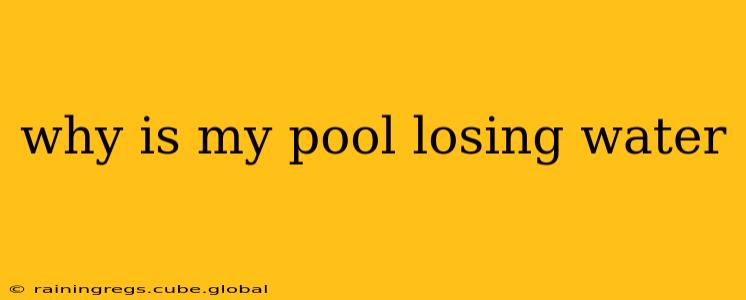Why Is My Pool Losing Water? A Comprehensive Guide to Troubleshooting Leaks and Evaporation
Losing pool water is a frustrating experience for any pool owner. It can lead to costly refills, potential equipment damage, and a generally unpleasant swimming experience. But before you panic, understanding the common causes can help you pinpoint the problem and find a solution quickly. This comprehensive guide explores the most frequent culprits behind a dwindling water level, helping you diagnose the issue and prevent future losses.
Is it Evaporation or a Leak?
The first step in troubleshooting your pool's water loss is determining whether it's due to evaporation or a leak. Evaporation is a natural process, especially in hot, windy, or sunny climates. However, excessive evaporation can be mitigated. A significant drop in water level, beyond what's expected from evaporation alone, strongly suggests a leak.
How Much Water Loss is Normal Due to Evaporation?
This is a crucial question many pool owners ask. The amount of water lost through evaporation depends on several factors:
- Climate: Hot, dry, and windy conditions lead to higher evaporation rates.
- Pool size and shape: Larger pools naturally lose more water than smaller ones.
- Pool surface area: A larger surface area exposed to the sun and wind means more evaporation.
- Time of year: Evaporation is more significant during warmer months.
As a general rule, you can expect to lose about ¼ to ½ inch of water per week due to evaporation. Anything beyond that warrants further investigation.
Where Are the Most Common Places for Pool Leaks to Occur?
Pinpointing the source of a leak can be challenging, but some areas are more prone to problems than others:
- Pipes and fittings: Cracks or loose connections in your pool's plumbing system are common leak sources.
- Pump and filter: These components can develop leaks over time due to wear and tear.
- Skimmer and main drain: These essential components can crack or become compromised.
- Tile and grout: Cracks in the pool's tile or grout can allow water to escape.
- Pool structure: Less common, but structural cracks in the pool shell itself can cause significant water loss.
How Can I Detect a Pool Leak?
Several methods can help you detect a pool leak:
- Visual inspection: Carefully examine all pool components, looking for obvious signs of leakage.
- Water level test: Mark the water level and check it after a few days, noting the drop. Keep in mind typical evaporation rates.
- Leak detection dye test: This method involves adding a special dye to the pool water to visually pinpoint the leak location.
- Pressure test: This involves temporarily isolating sections of your plumbing system to identify leaks.
- Professional leak detection: If you can't locate the leak yourself, a pool professional equipped with specialized equipment can help.
What are the Best Ways to Prevent Pool Water Loss?
Preventing water loss involves proactive measures:
- Regular maintenance: Proper maintenance of pool equipment and regular cleaning helps prevent problems.
- Pool cover: Using a pool cover significantly reduces evaporation.
- Proper chemical balance: Maintaining correct water chemistry helps prevent corrosion and damage to pool components.
- Regular inspections: Periodic inspections can help catch small leaks before they become major problems.
How Much Does Pool Leak Repair Cost?
The cost of pool leak repair varies significantly based on the leak's location, severity, and the required repair methods. Minor repairs might cost a few hundred dollars, while more extensive repairs, such as replacing a section of pipe or fixing a structural crack, can run into thousands.
By understanding the common causes of pool water loss and employing the troubleshooting techniques outlined above, you can effectively address the issue and keep your pool filled and ready for swimming. Remember, early detection is key to minimizing repair costs and preventing further damage. If you suspect a significant leak, it's always best to consult a qualified pool professional.
